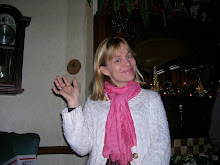Like many small towns, my hometown has a traditional summer festival that celebrates a unique aspect of American life just for fun. In this case, it's Derby Days, which is always held in August and begins with a parade down Main Street.
Parade participants are staples of small-town life: The high school band. Little League football players and cheerleaders. The youth soccer association. Churches, businesses and veterans. This year, the armed forces were represented by a small group soldiers from conflicts as far back as World War II and as recent as Afghanistan.
Years ago, during an interview for the dedication of a new VFW Post in upstate New York, the topic turned to post traumatic stress disorder. "We didn't have a name for it," a WWII veteran said then (I'm paraphrasing) "but we all knew we weren't the same. We talked to each other."
But not everyone talked about it. My great-uncle Powell Henry was drafted into World War II. Because he'd been studying to be a doctor, he served as a medic, both in Europe and Asia. Although he was physically unharmed, he wasn't the same man after the war. When he came home, he put away his med kit, hid his medals and never told his stories. He lived on the family farm, growing tobacco, until his death in 1989.
In my studies and research for medieval romances, I've never come across an individual knight's reflections on war. In fact, I've not come across an individual's reflection on anything. However, drawing on more modern experiences, I assume the Crusaders (at least some of them) returned home different men. After all, how much can "being human" have changed in a thousand years?
The truth is I have no idea whether 12th century knights were changed by war or if they ever sat around the hearth and discussed it with fellow veterans. I make it so in my WIP, but I can do that because it's fiction.
How about you? As an historical author or reader, do you think war has always changed those who fought?


3 comments:
Yes, like you I can't see how it wouldn't change somebody.
However I'm sure there would be a difference between a Knight brought up to battle from a very young age, where wars tended to be part of life, and a civilian called up to fight, as in the World Wars. The Knight would have had years to prepare, whilst the civilian would be thrust into a strange and frightening environment.
Hi Keena - I think war must have always changed people. And look at the Iliad - when Hector speaks of the horror of the city falling and what will happen to his wife Andromache, it reveals a dread that 'speaks' across the ages
I assume that seeing death dealt to friends and brothers in arms in hideous and sudden ways would stun a person. I, too, have uncles who never spoke of their experiences in Italy and Germany in WWII, and I have other friends who do not speak of Vietnam. The lessons are too bitter, even decades later. War brings such trauma that it matters not what weapons are used, or what armour worn. The results are painful and in many cases so unforgettable, they must be "forgotten" to be borne.
Post a Comment